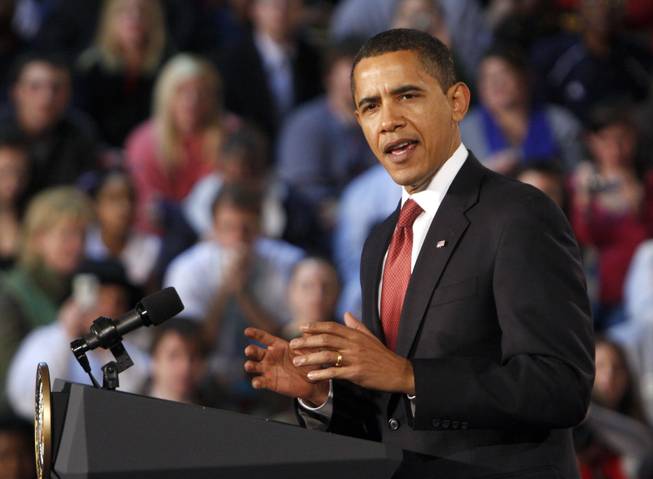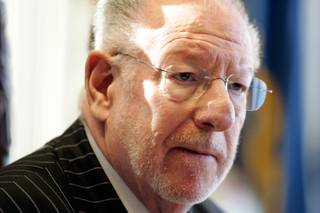
bloomberg news file
When President Barack Obama said that executives ought not use bailout money to pay for trips to Las Vegas, city and tourism officials went to its defense as a business-friendly destination.
Sunday, Feb. 15, 2009 | 2 a.m.
Reader poll
Audio Clip
- Hear Mayor Oscar Goodman's press conference Wednesday on a letter he sent to President Obama
-
Related Documents
Sun Archives
If Las Vegas’ tourism officials and elected leaders overreacted to President Barack Obama’s remarks last week about corporate execs inappropriately taking trips here, it reflects how precious they hold business travel as a crucial variable in the city’s tourism equation.
Developing that niche market, they say, has taken decades of hard pitch work in the trenches, where the depth of a Rolodex is more important than how many showgirls can be crammed into a full-page ad or television commercial.
Although Obama’s comments were clearly directed at companies receiving federal bailout money, tourism officials say the president’s words nevertheless created the perception in some people’s minds that corporate travel planners should eschew Las Vegas. Not taking any chances, the Las Vegas Convention and Visitors Authority will launch a six-figure ad campaign this month aimed at correcting any misperceptions.
The ads, which will run in The Wall Street Journal, USA Today and various business publications, will feature testimonials from companies that have held meetings in Las Vegas.
“We’re going to pound away at the whole business message,” said Billy Vassiliadis, chief executive of the advertising firm R&R Partners, which produced Las Vegas’ famous “what happens here, stays here” slogan and is developing the new campaign. “There’s a really strong argument that if you’re not meeting in Las Vegas, you’re not running a smart business. Nothing comes close.”
But that wasn’t always an easy case to make.
It wasn’t until the mid-1990s that entertainment and dining ousted gambling from the No. 1 spot in consumer research.
Karen Gordon, president of Las Vegas-based Activity Planners Inc., recalled a time when companies were wary of sending employees to Las Vegas for company-paid getaways as rewards for good work, a practice known as incentive travel.
She cited the story of a sales manager at the old MGM Grand who was rebuffed for more than two years by a major company that books incentive travel — until one of the company’s major clients, the vice president of a Fortune 500 company, wanted a room at the casino for a big fight. With every room booked, the resort’s sales manager offered the executive his own condo, which he had just bought. Since then, the incentive house has done “millions and millions of dollars” in business here, Gordon said.
The story is illustrative of two points: Las Vegas spent years earning the trust of corporate America — and did it largely though personal contacts.
“What happens here, stays here” might work for tourists nationwide, but appealing to the business crowd requires a customized, more sophisticated approach, said Chuck Bowling, executive vice president of Mandalay Bay, home of the fifth-largest convention center in the country. “It’s sitting down one-on-one,” he said. “It’s asking, ‘How can we accommodate you?’ It’s not a blanket campaign. It’s building up relationships over years.”
As Vassiliadis put it, “Nothing beats direct sales.”
And tourism officials say the perception problem stirred by Obama’s remarks threatens to undo all the hard work. “We are speaking out loudly because we’ve earned this reputation and we don’t want anyone to take it away,” Bowling said. “We want the CEOs and businesses to keep coming.”
To be sure, the effect has been limited — but Bowling has felt the sting. Last Monday, after Obama’s remarks, Goldman Sachs Group Inc. said it had moved a three-day conference from Mandalay Bay to San Francisco amid what it called a broad review of its activities. The bank has accepted $10 billion in federal bailout money.
Republican Sen. John Ensign criticized the move as “purely a phony public relations gimmick,” saying the relocation had cost the bank a $600,000 cancellation fee.
The other example: Wells Fargo & Co., which, the week prior, canceled a planned employee recognition conference at Wynn Las Vegas after congressional criticism.
Michael Hughes, associate publisher of Tradeshow Week, said the city had been caught in the political crossfire over the bank bailout. “Will financial services think twice about booking Las Vegas? Maybe,” he said. “But they’re going to think twice about booking anywhere.”
Because of the recession, the corporate meeting and convention markets are weak nationwide, Hughes said. “These are the types of events that are canceled in this environment,” he said.
For example: Last week, State Farm Insurance Co. canceled the sales convention it holds here every three years. The event would have hosted 17,000 agents. Company spokesman Jeff McCollum said the recession was the reason for the cancellation but that the company might reschedule later this year.
“It’s not about Las Vegas. We love Vegas,” he said. “State Farm is a family-oriented, conservative company, and we know Vegas has that fun reputation. But it’s also well-respected for its convention business. It has the facilities and the services to handle a group our size.”
Plus, McCollum noted, many agents bring their spouses and families. “After the meetings, they like to go out to dinner and have fun and go to the shows,” he said.
At the other end of the spectrum is Laborie Medical Technologies, a Canadian equipment manufacturer. Kelly Maginnis, Laborie’s marketing course administrator, said the company, which has U.S. offices in Vermont, hosts four educational meetings in Las Vegas a year, attended by about 16 doctors, nurses and technicians in the urology field.
“Las Vegas is always one of our top choices,” she said. And it’s one of the most popular locations Laborie uses.
The company uses nongaming hotels. (Last week it held a meeting at the off-Strip Platinum.) “It’s almost like we’re not in Las Vegas when we’re in the meeting,” Maginnis said. “But all the casinos and the amenities are within walking distance. Our attendees can mix work and play.”
The Las Vegas Convention and Visitors Authority has marketed that message in the past. Its current campaign: “Not business as usual.” The authority has even designed a specific Web site for meeting planners, vegasmeansbusiness.com. It highlights the Fortune 500 companies that have held meetings here, adding “that’s good company to be in.” The campaign also cites golfing, special events, dining and shopping.
Gordon, of Activity Planners, emphasizes what she calls “another side of Las Vegas,” meaning horseback riding in Red Rock Canyon, an artist’s reception downtown or a concert performance at UNLV.
“We’ve evolved as a brand,” said Rossi Ralenkotter, the authority’s president and chief executive. “We have proven that serious business is conducted in Las Vegas.”


Join the Discussion:
Check this out for a full explanation of our conversion to the LiveFyre commenting system and instructions on how to sign up for an account.
Full comments policy